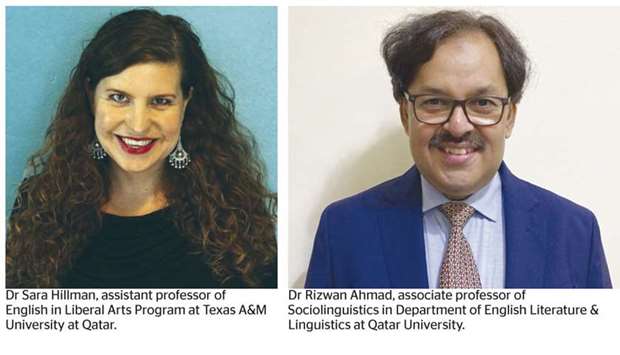Language barrier is an obvious issue in a country where people from different backgrounds live. Though the natives of Qatar are generally monolinguists with Arabic being their mother tongue, there are expatriates from many countries speaking different languages.
Importance of multiple languages spoken by different expatriate communities was underlined at the outset of Covid-19 pandemic. The Government of Qatar did well to have essential messages translated into different languages of expatriates to effectively raise awareness about the virus outbreak.
A recent study conducted by two university professors in Qatar has further established the effectiveness of disseminating important messages regarding the coronavirus in the languages of expatriates. The study has been carried out by Dr Rizwan Ahmad, associate professor of Sociolinguistics in Department of English Literature & Linguistics at Qatar University, and Dr Sara Hillman, assistant professor of English in Liberal Arts Program at Texas A&M University at Qatar.
Gulf Times recently spoke to Dr Rizwan, who has PhD from University of Michigan in the United States, regarding the study and its findings. Language study is his passion. An expatriate from India, he speaks Urdu, Hindi, English, and Arabic fluently. As a linguist, he conducts research on how people use language; how languages change; and how people communicate.
When the novel coronavirus hit Qatar in early March, it was clear to all that there is no medicine for it. The only way to protect oneself and others is to take precautionary steps. “This means that the most effective way to fight the pandemic was to ensure that the message is delivered to all in a timely manner and in a language they understand and trust,” said Dr Rizwan when asked how they started the study.
He added: “On March 13, I saw on Twitter some Covid-19 awareness video messages recorded by Hamad Medical Corporation health professionals in the languages of a particular expatriate community, a larger number of whom are blue-collar workers. I found it to be extraordinary that the government would cater to the languages of the migrant workers in ensuring that they get the information in their own languages. I wrote a preliminary piece which was published on a linguistics website. It received about 5,000 views.”
Dr Rizwan began to dig deeper. “At this point, Dr Sara Hillman joined me. We started working together on this fascinating topic. We found that different departments of the government were creating written awareness posters in the languages of the expatriate communities in addition to Arabic and English.”
When asked what kind of research method they used, he said: “We used a mixed research method in which we studied written pamphlets, audio messages, and video messages. We also interviewed key people involved in the campaign from different communities and media outlets.”
Speaking about how successful has been the policy of spreading awareness messages in migrant languages in containing the Covid-19 outbreak in Qatar, Dr Rizwan said: “Communication at a time like Covid-19 pandemic is referred to as crisis communication in which three principles are critical. First is availability. It means whether or not the information is available in languages of the people. Second is accessibility. It means whether or not the people can access the message easily. A research shows that while the use of Twitter among Asian expats is low (7%), Facebook use is high (86%). Imagine what would happen if an important message was posted only on Twitter. It would never reach the target. Similarly, a large number of the Asian workers in Qatar are not fully literate. So, the government circulated the messages on FB and radio stations so people can access them easily.”
The researcher further said: “Third important principal is acceptability. It refers to whether or not people trust the message and accept it to change their behaviour. Message coming in their language and from the people they know and trust is more acceptable. The government did a brilliant job of mobilising community leaders speaking different languages to deliver awareness messages. Since social distancing is also involved, not going to mosques, the government sought help from religious leaders such as imams to deliver the message that praying at home is as rewarding as praying in the mosque.”
Further elaborating the advantages of communicating in one’s own language, Dr Rizwan said: “Using languages of the people has two advantages. First, receiving a message in your own language avoids misunderstanding and delivers the message as intended. Secondly, the research has shown that people have a higher trust in a message if it is in their own language.”
The research will be published in a linguistics journal published by Mouton de Gruyter.

..
